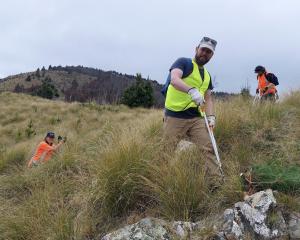A Kaiata couple are upset the West Coast Regional Council wants them to remove pampas grass from their property.
Mick and Jean Culling love the tall pampas grass which screens a large water tank and they see it as part of their West Coast heritage.
"It’s just a really huge display and it’s just amazing. We love it," Mrs Culling said.

Mrs Culling said she loved seeing the pampas grow wild along State Highway 7, through Kaiata and towards Greymouth.
So they were stunned recently to find a notice in their letterbox saying council wants it removed.
"We’ve got a letter of inspection from the regional council which said we have to remove it and destroy it."
The news was wrenching.
At the same time they had been informed wild pampas growing on the roadside opposite their property was to be sprayed by council — despite it being in an officially designated no-spray area.
The pampas was part of the region’s landscape going back many decades, she said.
"It’s part of our history."
Mr Culling said if the pampas must go it would be on their own terms and he was less than impressed.
"It’s on private property and it’s got nothing to do with the regional council — and there is the joker spraying in a no spray zone.
"If we have to take it out, we’ll be doing it in our own time."
Council operations manager Shanti Morgan said council recently beefed up enforcing its pest plant control obligations under the Biosecurity Act.
Part of that was to directly advise property owners where an identified weed needed to go.
The work was a statutory requirement for council based around a previously consulted regional pest plant management plan.
This had utilised community input and technical advice on the "key weeds" based on the risk they posed to pastoral farming or aquatic biosecurity in the region.
The council had two staff working to directly approach landowners where needed, Ms Morgan said.
"If we can’t contact [them], they then serve an inspection notice."
That inspection notice was a signal to property owners rather than about council going straight to enforcement action.
The approach was "to educate people and find ways to minimise the pest plant".
"Enforcement is not something that we want to do — we haven’t done it very often to date.
"We try to leave that as a last resort.
"We want to work with people."
Pampas — native to South America — was an environmental threat to wetlands and the coastal marine environment in the region.
It is commonly seen along road and rail corridors as well.
By Brendon McMahon











